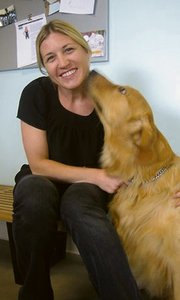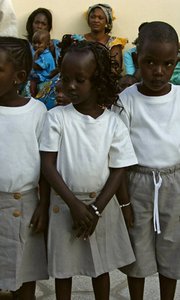High Design With a Heart
Evans Group combines high-end contracting with heartfelt philanthropy
From her client roster packed with some of Los Angeles’ hottest contemporary designers to her vertically integrated system of fashion development and production for high-end fashion, you’d never guess Jennifer Evans, chief executive of the Evans Group, fell into fashion very much by accident. “It was never my end goal to work in fashion,” Evans said, sitting in her office at the Evans Group headquarters in Los Angeles’ up-and-coming Toy District.
After studying business in San Francisco, Evans worked for a designer in Northern California before moving to New York to oversee the brand’s factory. “It wasn’t for me,” Evans said. Instead, she moved to Boston to develop and manage education projects for nonprofit organizations. Now back in California, one of her projects involved creating jobs by setting up a sewing shop in refurbished shipping containers and answering newspaper ads for sewing jobs. “I had no idea what I was doing,” Evans said with a laugh. Inundated almost overnight with orders from manufacturers, Evans saw a business opportunity— and an opportunity to continue to help the community.
In 2004, Evans launched the Evans Group and began offering full-package production, from pattern-making and grading to samples for the runway and small-volume production. Using the resources and outside-the-box thinking she honed in her nonprofit work, Evans hired highly skilled workers—many of whom had lost their jobs as laborintensive work was sourced overseas. In 2006, she moved her shop into a 3,000-squarefoot space on Santa Fe Avenue.
After her experience in New York, Evans decided to focus on working with local fashion-forward designers. “No one else wants to do high-end or small-volume production in Los Angeles,” Evans said. That creates a problem for contemporary designers looking for someone to realize designs that stray far from simple Tshirts and A-line skirts. But with her team, Evans had the ability to produce intricate and unorthodox designs for brands such as Society for Rational Dress, Grey Ant, Jeremy Scott, Morphine Generation, Geren Ford, Juan Carlos Obando, Anzevino & Florence, Jennifer Nicholson and Cosa Nostra.
“I like to work with interesting designers for a couple reasons. One, I wanted to create a place that fosters fashion-forward design—which there is a lot of in Los Angeles. Two, because we have such a focus on being socially conscious and we pay our workers well, it takes a different type of designer to appreciate what we’re trying to do,” Evans explained. It isn’t always easy to get designers to see the benefit of paying a little more for the fair wages, craftsmanship and service.
With a rotating roster of about 30 clients, it doesn’t seem Evans is having too hard a time convincing designers of the benefits of preserving domestic work and manufacturing apparel humanely.
Geren Lockhart, designer of the popular Geren Ford brand, was an easy convert to the Evans Group philosophy. Already an advocate of being socially and environmentally conscious, Lockhart appreciates Evans’ focus on quality work, fair wages and social dedication. “I’m impressed with her. I haven’t found a level of work above theirs in L.A.—and I like to consider myself resourceful,” Lockhart said.
Making contemporary clothes is a challenge, Lockhart said, because it falls between the more expensive designer offerings and the much less expensive trend-driven offerings. For Lockhart, having a production partner that understands her motivation is a big bonus.
Designer Kelly Nishimoto has worked with the Evans Group for two seasons and said it is worth it to pay a little extra for the Group’s expertise and one-stop-shopping convenience. “They’re willing to work with you and teach you the ropes. They saved me time and headaches,” Nishimoto said. Evans did patterns, grading, samples and production runs on leggings and tunics for Nishimoto’s eponymous brand.
Unlike some other contractors, the Evans Group rises to the challenge of innovative design, said Cosa Nostra designer Jeff Sebelia. “They don’t try to dumb-down our designs,” he said. The Evans Group produces dresses, blazers and hoodies for the edgy, punk-inspired brand.
In her first year in Los Angeles, Evans will do nearly $1 million in business, but she’s looking for smart ways to grow her business.
Problem solving meets social work
With 30 employees, including dedicated patternmakers and four staff managers, Evans said one of her challenges is finding highly skilled workers to keep up with the demand. “We won’t make over 500 pieces per style—we’re not trying to compete with the [high-volume] manufacturers. But we are trying to put an emphasis on our development and sampling,” she said.
That means she needs to bulk up on versatile tailors who can work on an origami-like dress one day and flowing trousers the next. “Those types of craftsmen can be hard to find in Los Angeles because so many people are just used to making one thing day in and day out.” To compensate, Evans hires and trains tailors and offers her employees perks such as free English courses— but sometimes that’s not enough.
In a move that may surprise some, Evans has partnered with an African nonprofit group, the International Union of Concerned Senegalese, to create a guest-worker program.
In 2006, Evans went to the West African country to interview prospective guest workers and expects the first five guest workers to arrive in the United States this summer. Once here, the Senegalese guest workers will work at the Evans Group and be trained to use modern machinery. At night, they will be given business courses and English-language classes as part of Evans’ partnership with the smallbusiness incubator Fashion Business Inc.
After three or four years in the United States, the guest workers will return to Senegal with new skills and donated equipment to set up their own sewing facility at home. Part of the plan calls for sending the tailors home with refurbished shipping containers to house their new shops— much in the same way Evans started her business. “It would be a very low-cost way to get them started and give them a place to work,” she said. As Evans waits for her first group of guest workers to arrive, she is already working on expanding the program. “Getting visas takes time, so we’re trying to process about 18 workers now so that they can come as we need them.”
While the Evans Group’s clients won’t see the benefits of the guest-worker program for a while, Evans gives them the opportunity to get in on her do-gooding. This January, the Evans Group donated 100 uniforms to Senegalese kindergarteners made from leftover fabric donated by Society for Rational Dress’ Corinne Grassini. Evans’ employees donated their time to make the tiny uniforms. This season, Evans will make 500 uniforms with donated fabric.
For more information on the Evans Group, call (213) 626-4377 or visit www.evansgroupla.com.























